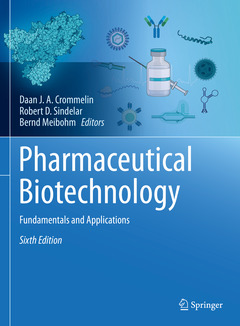Description
Pharmaceutical Biotechnology (6th Ed., 6th ed. 2024)
Fundamentals and Applications
Coordinators: Crommelin Daan J. A., Sindelar Robert D., Meibohm Bernd
Language: English
Subjects for Pharmaceutical Biotechnology:
690 p. · 15.5x23.5 cm · Paperback
Publication date: 01-2024
682 p. · 21x27.9 cm · Hardback
Description
/li>Contents
/li>Biography
/li>Comment
/li>
This introductory text explains both the basic science, production, quality, dosage forms, administration, economic and regulatory aspects and the clinical applications of biotechnology-derived pharmaceuticals. It serves as a complete one-stop source for undergraduate/graduate pharmacists and pharmaceutical science students. An additional important audience are pharmaceutical scientists in industry and academia, particularly those who have not received formal training in pharmaceutical biotechnology and are inexperienced in this field. The rapid growth and advances in the field made it necessary to revise this textbook in order to continue providing up-to-date information and introduce readers to cutting edge knowledge and technology of this field. This Sixth Edition completely updates the previous edition and includes additional coverage on new approaches such as oligonucleotides, siRNA, mRNA, gene therapy, cell therapies, monoclonal antibodies and vaccines. With more than 3-million-chapter downloads, the fifth edition of the textbook has achieved widespread distribution as a key educational resource for the field of pharmaceutical biotechnology.
Molecular Biotechnology.- Biophysical and biochemical analysis of recombinant proteins.- Production and downstream processing of biotech products.- Formulation of biotech products, including biopharmaceutical considerations.- Pharmacokinetics and pharmacodynamics of peptide and protein drugs.- Immunogenicity of pharmaceutical proteins.- General considerations of monoclonal antibodies from structure to therapeutic application.- Genomics, Other “Omics” Technologies, Personalized Medicine and Additional Biotechnology-Related Techniques.- Dispensing biotechnology products: handling, professional education and product information.- Economic considerations in medical biotechnology.- Regulatory framework for biosimilars.- Vaccines.- Oligonucleotides and siRNA.- Gene therapy.- Stem cell technology.- Therapeutic Applications.-Endocrinology.- Insulin.- Follicle-stimulating hormone.- Growth hormone.- Cardiovascular and Respiratory Applications.- Recombinant coagulation factors and thrombolytics.- Recombinant human deoxyribonuclease.- Oncology.- Monoclonal antibodies in oncology .- Hematopoetic growth factors.- Inflammation and Immunemodulation.- Monoclonal antibodies in transplantation.- Monoclonal antibodies and antibody-based therapeutics in anti-inflammatory therapy.- Interferons and interleukins.- Anti-infectious diseases.- Monoclonal antibodies.- Enzyme replacement therapy.
Daan J.A. Crommelin is Professor Emeritus, Department of Pharmaceutical Sciences, Utrecht Institute for Pharmaceutical Sciences, Utrecht University, Utrecht, The Netherland. He is an elected fellow of the International Pharmaceutical Federation (FIP) and the American Association of Pharmaceutical Scientists (AAPS).
Robert D. Sindelar is a Professor and Dean Emeritus, Faculty of Pharmaceutical Sciences, The University of British Columbia (UBC). He is an elected fellow of the Canadian Academy of Health Sciences, and an elected fellow of the International Pharmaceutical Federation (FIP). He previously served as Vice President of Innovation, Research & Academic Affairs at Providence Health Care (PHC), President of the PHC Research Institute and Associate Dean Research in the UBC Faculty of Medicine
Bernd Meibohm is Distinguished Professor, Associate Dean for Research and Graduate Programs, and Chair of the Department of Pharmaceutical Sciences at the University of Tennessee Health Science Center College of Pharmacy, Memphis, Tennessee, USA. He is an elected fellow of the American College of Clinical Pharmacology (ACCP) and the American Association of Pharmaceutical Scientists (AAPS).
Completely updated with new chapters
Each section is self contained
Can be used as a course textbook, reference or by chapter




